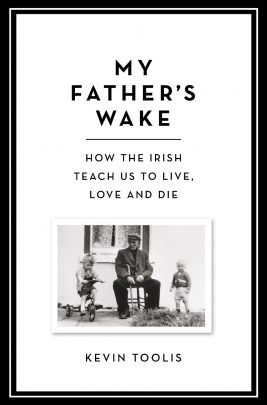Lessons from the Irish about living, loving and dying

The thought (and fear) of dying has been in my head since I turned 30. I have no idea why.
In reading My Father’s Wake I had no pre-conceived agenda, just a hope that the Irish and Kevin Toolis may shed some light (or darkness) on this so-often-avoided topic, at least in the Western world.
In reviewing a book I usually jot down page numbers that are of particular interest, especially if the book is a factual account. Pen, paper and a cup of tea to hand I open the cover (which in this instance is quiet and unassuming) and start to read. The points of interest I write down as, Note; p20, p 24, p26, p31, p 33 (do not agree) pages, 34, 36, 40……..
Wow!…. and so it goes throughout the whole read. Almost every other page is a ‘note’.
By now you should be thinking, get on with it, what is it about?
It is about Kevin, one of 7 children; it is about Sonny, his father, who is in the process of dying, it is about the circle of life, living, loving and dying so that one may get the most out of the whole package and accept death for what it is. More specifically it is also about traditional Irish life set in the island village of Dookinella and Kevin’s journey through his own life, as a family member. His involvement or confrontation with death in so many different countries and at so many different levels is an imperative thread in his narrative.

I loved his chapter titled Whispers in which he says, “Death is a universal occurrence with two options; you can do death well or you can do death badly”. Also in this chapter, the author introduces the concept of the Western Death Machine in which death is ‘blanked out’. A touch of realistic humour shines through as he writes, “Why isn’t there a FixUpYourFuneral.com comparative website for squeezing the best deal on caskets, grave locations cremations and catering?”
This is a far cry from dying on Dookinella where keening women openly lament the dead just as the Celts, the ancient Greeks and so many European cultures did.
Kevin Toolis recounts several deaths that he encountered. I found all three absolutely fascinating and filled with either poignancy or destruction; Eliza who died of AIDS in Malawi; Dina who was just twelve months old and part of a mass killing in Gaza and a suicide by a man in Essex, England where Kevin was employed in finishing off the magnificent grounds and was first to discover the body. (Rather ironic I felt). In the latter circumstance, he describes the face and demeanour of the wife, “A face like ice. Not a tear. Coldly angry. Mad, mad at the dead man.”
Continuing with this factual account we are returned to the ritual of Sonny’s (his father) dying and Kevin’s dawning deeper understanding which he so authentically described in words such as, “his death and wake was not an ending but a further binding between the dead, the living and the dead-to-be. A gift.”
It would spoil your reading of this book if I were to add any other of the pearls of wisdom encased in its pages. A must read for all of us caught up in life and even more so for all of us who are parents, especially of the young whom we so instinctively but possibly mistakenly want to protect from the reality of living, eventual death.
My Father’s Wake: How The Irish Teach Us to Live, Love and Die, by Kevin Toolis, is available in hardcover, paperback and digital editions from the publisher Hachette Australia, click here for details








 Proudly Australian owned and operated
Proudly Australian owned and operated